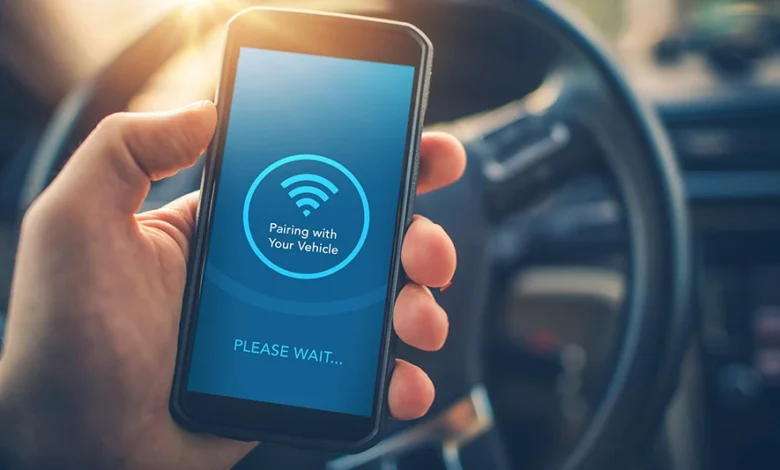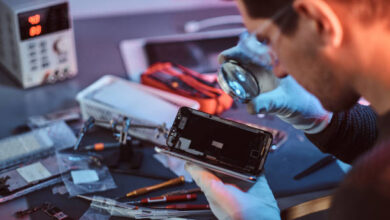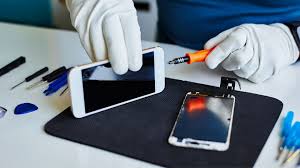The Rise of Drive-By Repairs Convenience vs. Security

In today’s fast-paced world everyone is looking for convenience and that’s where “Drive-By Repairs” come in. Drive-By Repairs mean that technicians come to you whether you’re at home at work or anywhere else. Instead of having to drive to a store or wait in long queues you can have your mobile fixed right where you are. This service is incredibly popular because it saves time and makes repairs much easier. Whether it’s a cracked screen, a slow phone or any other problem, Drive-By Repairs bring the solution directly to your doorstep.
However with convenience comes a concern: security. When a technician comes to fix your phone they need to access your device which means your personal information could be exposed. With emails, photos , messages and even banking apps on our phones the risk of data being compromised is real. That’s why it’s important for companies offering Drive-By Repairs to ensure that your data stays safe during the repair process. They need to take extra precautions to make sure no one can access your private details while your phone is being fixed.
The Importance of Data Security in Mobile Repairs
Mobile phones are no longer just a tool for making calls; they hold all our personal information. From photos and contacts to bank details and work-related data our phones store almost everything. Because of this when a phone needs to be repaired protecting that information is crucial. In “Drive-By Repairs” where technicians come to your location to fix the device the risk of unauthorized access to your data increases. This makes it even more important for repair companies to focus on data security during the repair process.
Companies offering Drive-By Repairs must have strict data security policies in place. They need to make sure that only the necessary repairs are made without accessing any sensitive information on your phone. Technicians should be trained in privacy practices and they should only work in a secure environment. When your device is being repaired on-site, having strong data security measures in place can help you feel safe and confident that your information is protected throughout the process.
Pre-Repair Data Protection Strategies
Before a technician starts any repair on your phone it’s important to take steps to protect your data. One of the first things you should do is backup your phone. This way even if something goes wrong during the repair you can restore your data. Whether you use cloud storage or a computer to backup your files, having a copy of your important data will give you peace of mind. It’s always better to be safe than sorry and backing up is a simple way to ensure that nothing is lost during the repair.
Another pre-repair strategy is to lock your phone. You can set up a password PIN or biometric security (like fingerprint or face recognition). This helps ensure that only you can access your device during the repair. If possible you can even log out of your accounts or temporarily remove any sensitive information before the technician arrives. These steps help protect your privacy even if the technician needs to access your device for repairs. By taking a few minutes to secure your phone you can enjoy the benefits of Drive-By Repairs without worrying about data theft.
Technician Training and Data Privacy Awareness
A big part of keeping your data safe during Drive-By Repairs is making sure that the technicians are properly trained. When you invite someone to repair your mobile device you want to trust that they will respect your privacy. Technicians should be trained not just in how to fix the device but also in how to handle your personal data responsibly. They should understand the importance of data privacy and be aware of the risks of accessing sensitive information on your phone.
Many repair companies now offer specialized training for their technicians teaching them how to handle personal data securely during Drive-By Repairs. This includes ensuring that no personal details such as passwords or bank information are accessed or shared. Technicians should also be familiar with the legal and ethical guidelines around data privacy so they know exactly what they are allowed to access and what is off-limits. When a technician is trained in data privacy it makes the repair process safer for everyone involved.
Using Secure Tools and Software During On-Site Fixes
When performing Drive-By Repairs the tools and software used by technicians must also be secure. Any software or equipment that interacts with your phone needs to be trusted and safe to use. Technicians should use specialized repair tools that are designed to fix devices without compromising the integrity of your data. These tools should be regularly updated to ensure they are protected against security threats.
In addition to physical tools, secure software is also essential. Many technicians use apps or programs to diagnose and repair mobile devices. These programs should be trusted and they should not have access to your personal information unless necessary for the repair. A good repair company will only use secure well-vetted software that protects both the device and your data. This way you can be confident that your phone will be fixed without risking any data loss or theft.
Customer Consent and Data Access Guidelines
One of the most important aspects of protecting data during Drive-By Repairs is making sure that customers are fully aware of what is happening with their phones. Before any repair work begins customers should be asked for their consent. This means that the technician should explain what repairs will be performed and how the device will be handled during the process. If a technician needs access to sensitive information on the phone the customer should be informed and asked for permission first.
Having clear data access guidelines is also essential. Customers should know exactly what data a technician can and cannot access. If a technician only needs to fix a cracked screen for example there is no reason for them to access your messages or photos. Setting clear boundaries before the repair ensures that both the technician and the customer are on the same page about what is acceptable and what is not. This helps build trust and ensures that your privacy is respected during Drive-By Repairs.
On-Site Repair Security Measures: What to Expect
When a technician comes to your location for a Drive-By Repair you might wonder how the company ensures your data is secure. There are several on-site security measures that should be in place to protect your information during the repair. First the technician should always work in a private and secure area such as a room in your house or office. This prevents anyone else from accidentally viewing or accessing your device while it is being repaired.
The technician should also follow a strict protocol for handling your phone. They may ask you to unlock the device only when necessary and should avoid accessing any personal apps or files unless it’s part of the repair process. If the technician needs to install software or update the phone they should use secure trusted programs that don’t pose a risk to your data. These security measures help protect your device while ensuring that the repair is completed safely.
How to Protect Your Data During a Mobile Repair Service
While the repair company should take care of your data there are also things you can do to protect your information during Drive-By Repairs. One of the simplest things you can do is back up your phone before the technician arrives. This ensures that even if something goes wrong you won’t lose any important information. It’s also a good idea to temporarily disable features like Bluetooth and Wi-Fi just in case the technician needs to access the internet or connect to another device during the repair.
Another step is to clear your sensitive data like passwords or banking information before the technician starts. You can log out of your accounts, remove any sensitive apps or even perform a factory reset if you want to be extra cautious. This ensures that your private information remains secure even if the technician needs to interact with your phone. Taking these precautions before the repair can help you feel more confident about the process and protect your data from any potential risks.
Post-Repair Data Security Check and Best Practices
After the Drive-By Repair is completed it’s important to double-check your phone’s data security. Make sure that everything on your device is in order and that no unauthorized changes have been made. If the technician accessed any of your personal information during the repair you should verify that nothing has been altered or shared without your consent. One good practice is to change your passwords and PINs after the repair especially if the technician had access to any sensitive accounts.
Another post-repair step is to re-enable any security features you may have temporarily turned off such as Wi-Fi Bluetooth or your phone’s lock screen. This ensures that your device is fully protected again. It’s also a good idea to back up your phone one more time after the repair just in case anything was lost or changed during the process. By following these post-repair best practices you can ensure that your data remains secure and that your phone is in top working condition.
Conclusion
Drive-By Repairs are a convenient and efficient way to get your mobile device fixed without leaving your home. However they also raise important questions about data security. By following best practices and implementing strict data protection measures both repair companies and customers can ensure that their information stays safe during the process. Whether it’s backing up your phone using secure tools or having technicians trained in data privacy, everyone plays a role in making sure that mobile repairs are both convenient and secure. With the right precautions Drive-By Repairs can continue to offer a hassle-free service without compromising your privacy.





